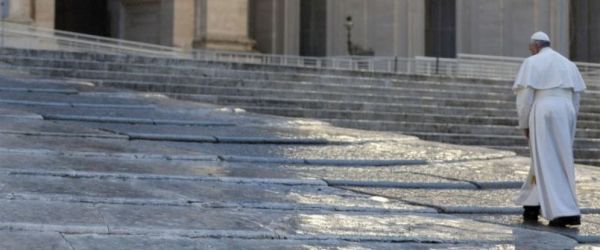Jesus, after having compared himself to the vine and us to the branches, Jesus, explains what fruit is borne by those who remain united to him: this fruit is love. He again repeats the key-verb: abide. He invites us to abide in his love so that his joy may be in us and our joy may be full (vv. 9-11). To abide in Jesus’ love.
Let us ask ourselves: what is this love in which Jesus tells us to abide to have his joy? What is this love? It is the love that originates in the Father, because “God is love” (1 Jn 4:8). This love of God, of the Father, flows like a river in his Son Jesus and through him comes to us, his creatures. Indeed, he says: “As the Father has loved me, so have I loved you” (Jn 15:9). The love Jesus gives us is the same with which the Father loves him: pure unconditional love, freely given love. It cannot be bought, it is free. By giving it to us, Jesus treats us like friends — with this love —, letting us know the Father; and he involves us in his same mission for the life of the world.
And then, we can ask ourselves the question, how do we abide in this love? Jesus says: “If you keep my commandments, you will abide in my love” (v. 10). Jesus summarized his commandments in a single one, this: “that you love one another as I have loved you” (v. 12). To love as Jesus Christ means to offer yourself in service, at the service of your brothers and sisters, as he did in washing the feet of the disciples. It also means going outside of ourselves, detaching ourselves from our own human certainties, from earthly comforts, in order to open ourselves up to others, especially those in greater need. It means making ourselves available, as we are and with what we have. This means to love not in word but in deeds.
To love like Christ means saying ‘no’ to other ‘loves’ that the world offers us: love of money — those who love money do not love as Jesus loves —, love of success, of vanity, of power… These deceptive paths of “love” distance us from the Lord’s love and lead us to become more and more selfish, narcissistic and overbearing. And being overbearing leads to a degeneration of love, to the abuse of others, to making our loved ones suffer. I am thinking of the unhealthy love that turns into violence — and how many women are victims of violence these days. This is not love. To love as the Lord loves us means to appreciate the people beside us, to respect their freedom, to love them as they are, not as we want them to be; as they are, gratuitously. Ultimately, Jesus asks us to abide in his love, to dwell in his love, not in our ideas, not in our own self-worship. Those who dwell in self-worship live in the mirror: always looking at themselves. He asks us to overcome the ambition to control and manage others. Not controlling, serving them. Opening our heart to others, this is love, to be trusting, giving ourselves to others.
Dear brothers and sisters, where does this abiding in the Lord’s love lead? Where does it lead us? Jesus told us: “That my joy may be in you, and that your joy may be full” (v. 11). And the Lord wants that the joy he possesses, because he is in complete communion with the Father, also be in us insofar as we are united to him. The joy of knowing we are loved by God despite our infidelities enables us to face the trials of life confidently, makes us live through crises so as to emerge from them better. Our being true witnesses consists in living this joy, because joy is the distinctive sign of a true Christian. True Christians are not sad; they always have that joy inside, even in difficult moments.
May the Virgin Mary help us to abide in Jesus’ love and to grow in love for everyone, witnessing to the joy of the Risen Lord.
[Pope Francis, Regina Coeli 9 May 2021]












